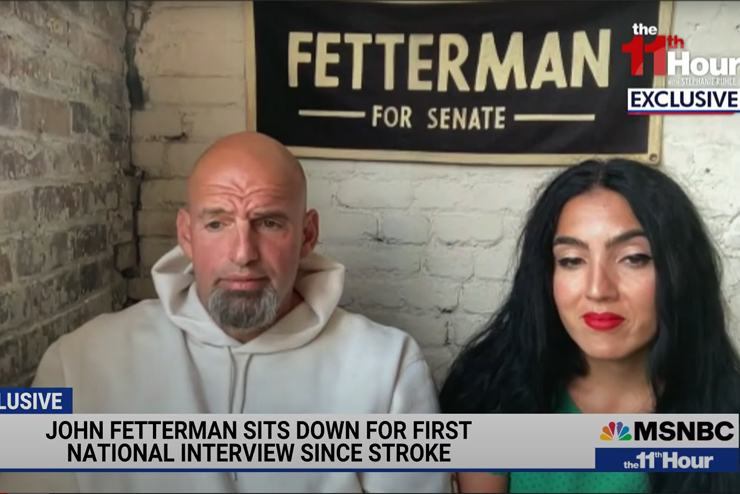In my state of Pennsylvania, Democrat John Fetterman—a perceptibly brain-damaged, tattooed far-leftist who has granted only a couple of interviews since suffering a stroke shortly before winning his party’s nomination—is apparently running away with the Senate race. Indeed, some polls claim that Fetterman holds an 18-point lead over his Republican opponent.
Fetterman’s apparent success comes despite the fact that he is a candidate who exists for most people only as a talking picture. Despite rarely being seen in public, his advertisements flash continuously on Pennsylvania TV screens, courtesy of his woke coastal donors. Awash in out-of-state money, he is running a “virtual” campaign from home, as did Biden in 2020. Many Democrats have been doing the same, using their party’s obsession over the risk of COVID as an excuse, to the point that Democrat strategists are warning that it may eventually hurt their reelection chances.
These Democratic stay-at-home types have the luxury of declining debates and campaigning from their basements because they enjoy the unstinting and often slobbering assistance of local media. Although Pennsylvania’s Republican senatorial candidate, Dr. Oz, has crisscrossed the state many times speaking to anyone who will listen, our CBS affiliate makes little mention of his relentless campaign touring, while the totally sedentary Fetterman is depicted as a bundle of energy despite his debilitating strokes. Although Fetterman refuses any offer from Oz to debate, it is Oz who is depicted, counterfactually, as the absent candidate.
According to a Pew Research Center report from October 2021, based on a survey of 17 advanced economies, the U.S. is more divided than the other societies surveyed. Ninety percent of U.S. respondents believe there are divisive conflicts between people who support different political parties, and nearly 60 percent of Americans surveyed think that their fellow citizens no longer simply disagree over policies but over basic facts. If there is disagreement in our deeply divided society over basic facts, the reason may be that our media often twists or suppresses what is actually happening.
Lest I forget, our media did bring Oz to life once, when he was shown referring to costly vegetables in our inflation-drained economy as “crudités,” using the French term rather than the English one. The media helped Fetterman jump on Oz as an out-of-touch elitist, a big-city snob only pretending to be an authentic Pennsylvanian. The media have also assisted the Democrats in throwing xenophobic charges against Oz because of his Turkish parentage and citizenship.
Not surprisingly, the same media never reveal any compromising facts about Fetterman, such as that he has never held a real job before he ran for elected office, or that even into middle age he received a generous stipend from his very rich, long-lived parents. His views on emptying prisons and releasing violent offenders would put him as far to the left as the radical attorneys general in New York, Philadelphia, Los Angeles, and Chicago. In fact, Fetterman is on the radical left of every social and economic question facing voters. But since he is only a virtual-reality candidate, these “basic facts” may not even matter.
The media have now moved from denouncing non-leftist politicians and political candidates as white supremacists—or in the case of black Republicans, tools of white supremacists—to an even more insidious way of twisting “basic facts.” Television news reporters have begun to fashion a fictitious reality and to inflict their inventions so persistently that we mistake the inversion for what is happening in real time. It is no longer even necessary to produce sentient candidates. If the media can find even semi-sentient ones who meet their ideological standard, they will happily produce more Joe Bidens or John Fettermans. Our media will invent made-to-order “progressives” and, if necessary, carry them across the electoral finish line, while their opponents are belittled or kept from public view. If 60 percent of our citizens disagree over “basic facts, the Senate campaign in Pennsylvania fully justifies this discord.
And, of course, it’s not just in Pennsylvania. I notice that Minnesota’s Democrat Governor Tim Walz finally came out of hibernation last month and blasted his Republican challenger, the physician Scott Jensen, for daring to liken Walz’s COVID lockdowns to the “authoritarianism” of the Nazis on their way to taking power. Jensen also dragged in, parenthetically, the Holocaust in his impromptu remarks, which elicited criticism from local Jewish groups and (needless to say) Minnesota’s lapdog media.
But Jensen’s comparison of the lockdowns with Nazi authoritarianism is entirely on target. Proclaiming and implementing such “emergency measures” were exactly the ways the Nazis operated in destroying established legal procedures in their country. In fact, this is the argument of Ernst Fraenkel’s The Dual State (1941), which is the work of a Nazi refugee who describes how Hitler’s dictatorship hollowed out what had been a very lawful state, in Germany. Like the Democrats, the Nazis appealed to a continuing emergency, which required rule by executive decrees. Isn’t Jensen right to see a familiar trend?
The Democratic Party has been taking its cues from earlier forms of totalitarianism. Far from reaching for grotesque comparisons, as the Democrats’ media lapdogs would claim, Jensen has been learning from the past.
[Chronicles Executive Editor Edward Welsch contributed to this article.]
Pennsylvania Lieutenant Governor John Fetterman and his wife, Gisele Almeida, were interviewed by MSNBC host Stephanie Ruhle on Aug. 31. (MSNBC)

Leave a Reply